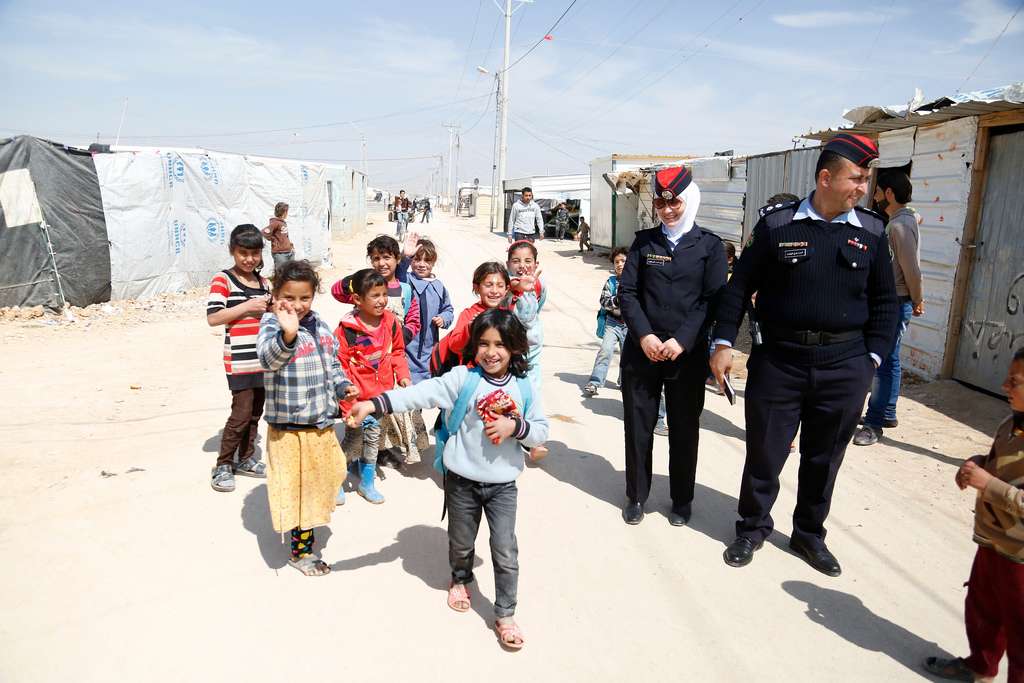Let the Refugees In
We shouldn't fear extending our hand to those who flee oppression. A world of zero risk is not an option, but the risk here is not significant.


Hysteria over the Islamic State is now focused on the refugees seeking to escape the violence in Syria and Iraq. Predictably, the Republican-controlled House yesterday voted to increase background checks on potential refugees, a demand for omniscience that would amount to exclusion. The bill faces trouble in the Senate, however, and President Obama, who wants to admit 10,000 refugees over the next year, has threatened to veto it.
The Washington Post reports:
The Republican bill would require the FBI director to certify the background investigation for each Syrian or Iraqi refugee admitted to the U.S., and Homeland Security and intelligence officials would have to certify that they are not security threats.
The Obama administration said Wednesday that the bill would "introduce unnecessary and impractical requirements that would unacceptably hamper our efforts to assist some of the most vulnerable people in the world."
As expected, attention in Washington is fixed on managing the blowback from long-standing U.S. militarism in the Middle East—and its rippling consequences—rather than addressing the root causes of anti-western terrorism: imperialism. The problem is that the plan for managing blowback will likely create new blowback.
Powerless refugees make easy scapegoats, and those who would condemn people to the living hell the U.S. government did so much to create deserve only scorn, doubly so because presidential ambitions are in play. The shameful history of fearing refugees and turning them away from our shores has been conveniently forgotten by opportunists looking to score cheap points by alarming the public.
Also as we've come to expect, the fear-mongers (who also tend also to be war-mongers) grossly exaggerate the danger in admitting refugees. No, engaging in humanitarianism need not entail unreasonable risks. Writing in The Atlantic, Russell Berman notes:
In the 14 years since September 11, 2001, the United States has resettled 784,000 refugees from around the world,according to data from the Migration Policy Institute, a D.C. think tank. And within that population, three people have been arrested for activities related to terrorism. None of them were close to executing an attack inside the U.S., and two of the men were caught trying to leave the country to join terrorist groups overseas….
This time it's different, we're told, with nightmare scenarios of terrorist infiltration in abundant supply. But, Berman writes: As U.S. officials and refugee advocates point out, that has never happened in modern history.
Not when the U.S. took in tens of thousands of Vietnamese refugees in the 1970s. Not when 125,000 Cuban "Marielitos" arrived by boat in 1980. And not in the desperate aftermath of more recent wars in Bosnia, Somalia, or Rwanda.
In fact terrorist infiltration is far from likely because:
Refugee applicants are subject to the highest level of security checks of any type of traveler to the U.S. The United Nations High Commissioner for Refugees initially chooses which refugees to refer to the U.S. after doing its own check. U.S. officials then conduct multiple in-person interviews [while refugees remain in distant UN camps] and verify a refugee's story with intelligence agencies and by running background checks through several government databases, including DHS and the National Counterterrorism Center. As a result of that extensive process, only around 2,000 Syrian refugees have been resettled in the U.S. since its civil war broke out in 2011—a much lower number than many previous refugee crises.
Berman adds, "A refugee applying for resettlement in the U.S., by contrast, must endure a screening process that takes as long as two years before stepping foot on American soil." (Emphasis added.)
Libertarians are properly skeptical of claims about government competence, despite the successful record Berman cites. However, one can explain the record without suddenly believing the government got something right. Considering that refugee applicants must undergo this high degree of scrutiny, the refugee program is unlikely to be the preferred route into the United States for would-be infiltrators; they would probably calculate they're more likely to get caught applying for refugee status than by trying to accomplish their objectives in some other way.
"If ISIS wanted to attack the United States," the Niskanen Center notes, "it need only dispatch one of the many foreign fighters who have come from the U.S. or the E.U. to do so"—or, as David Friedman reminds us, it could send some tourists. Actually, it would need only to mobilize so-called radicalized American citizens over the social networks. ISIS "would not need to attempt a two to three-year mission with a very low probability of success."
Thus the government most likely succeeds in weeding out terrorists because they don't present themselves to the authorities in the first place.
Of course the government's role in scrutinizing refugees makes (most?) libertarians uncomfortable. (For one thing, it's tax-financed, though it need not be.) But that's the way it's going to be for the foreseeable future. Nevertheless, we can take up the question of how a completely libertarian—by that I mean stateless—society would handle this matter. Would that society be vulnerable to people who mean it harm? I doubt it. Freed people are innovative, flexible, and entrepreneurial. We can be confident that a free society would devise methods of joint suretyship by which strangers could be vouched for, giving others confidence in dealing with them safely. In fact such mechanisms were devised long ago and would quickly be updated to be fully consistent with individual rights if the state were to leave the field.
The alternative to welcoming refugees is to leave them in the clutches of the Islamic State or in refugee camps where many would be vulnerable to the lure of "radicalization." Confinement has that effect. Admission to the United States would reduce terrorism. (Adopting a noninterventionist foreign policy would be an indispensable complementary step.)
Let us never fear to extend our hand to those who flee oppression. A world of zero risk is not an option, but the risk here is not significant.
This piece originally appeared at Richman's "Free Association" blog.


Show Comments (130)